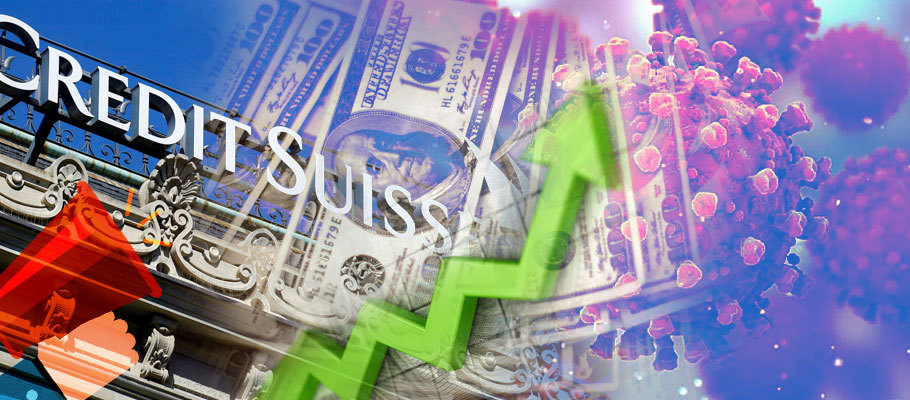
Published: July 9th, 2021
Renewed investor jitters over medium-term global growth prospects are sending forex traders to the dollar in droves, that’s according to new research from Credit Suisse. It's good news for dollar bulls but also suggests they’ll need to keep an eye on more than The US Fed if they’re going to make gains.
The recent 'hawkish' policy transition on inflation that emerged at The Fed’s June policy meeting is already pushing mid-year greenback outperformance, say Credit Suisse analysts. But the raging Delta variant of Covid-19 is having an impact too.
The bank’s researchers say the dollar is now benefiting from newfound investor appetite for safe-havens, particularly as US bond markets lose their appeal.
‘We’ve recently observed a flight from riskier assets that point to a change in sentiment,’ the bank said in a note to investors. ‘We’re interpreting dollar strength in 'safe haven' terms, as investors express concern about the prospects for medium-term growth globally.’
As expectations in America shift to a rise in interest rates appearing in 2023 rather than 2024, analysts believe demand for the dollar is rising too on the sentiment. What often happens is that in the wake of an interest rate rise, bond yields go up.
If the US's anticipated shift to higher rates does materialize, it will almost certainly deliver higher bond yields. That will tend to pull in more overseas investors. As their interest and investment levels rise, so will the dollar’s value.
Curiously, current data has American federal bond yields on the way down since the June Fed meeting. Should that trend continue, it will run counter to the dollar appreciation narrative now taking hold in some corners of the market.
At Credit Suisse, forex strategists have said they believe the shift in interest rate differentials favouring the greenback USD is running out of steam and likely won’t extend beyond this week’s trading session.
‘Seen against that backdrop, USD’s resilience looks less at odds with the negative USD price action you’d normally associate with a downturn in nominal US yields.’.
Adding support to that view is the declining pound-to-dollar exchange rate (GBP/USD) seen this week. It’s been sinking since it hit a peak of 1.41 back in early June and was quoted at 1.3798 at the time of writing.
A similar pattern is emerging with the euro-dollar rate: short-term depreciation consistent with a strengthening greenback. It currently sits at 1.1816.
Seeing the resilience in USD, Credit Suisse is telling its clients that in the absence of more evidence of yield support, ‘something unforeseen might be happening’.
The bank’s analysts note that simmering investor worries about a less constructive medium-term growth outlook are also coming to the surface.
As has been the case through most of the last 12 months, concerns about COVID-19 remain firmly on the list of risks. The new ‘Delta’ variant of the virus is proving to be much more transmissible, pushing up the medical threshold for the ‘herd immunity’ virologists hope to achieve with their immunization targets. Even with an accelerating vaccination rollout, the new variant threatens to scuttle current plans.
Deutsche Bank’s currency trading unit recently told Reuters that the data they’re seeing suggests herd immunity via vaccinations won’t be achievable for many countries, given the currently available portfolio of vaccines and the highly contagious nature of the delta variant.
That scenario is already taking shape in Israel, where cases are rising despite 64 per cent of the population outside the Occupied Territories having been vaccinated. In the UK, a third wave of infections is currently brewing, despite 65 per cent of the British population having at least the first Pfizer or Moderna vaccination dose.
The surge in new cases prompted UK Prime Minister Boris Johnson to warn that some 50,000 new cases could be reported daily in the coming weeks. New Health Secretary Sajid Javid has said the number could reach as high as 100,000 per day.
If exponential rates of infection can happen in a highly vaccinated population, it’s a safe bet that countries and markets with lower immunization rates will be hit much harder.
If there’s a mitigating factor for those worries, Credit Suisse says it might be found in the reduced level of hospital admissions from COVID infection. If the population proves to be more resilient to symptoms and treatments are becoming more effective, that weighs against a big dip in growth expectations.
There is another growth worry on the horizon, however. Recent soft economic data from China, also linked to the Delta variant, will undoubtedly aggravate investor jitters.
Non-manufacturing Caixin PMI from June has shown a significant decline in the services sector, which is largely down to an outbreak of the delta variant in Guangdong.
The dip in oil prices seen this week has also been noted by Credit Suisse as a negative for commodity-linked currencies like the Australian (AUD) and New Zealand (NZD) dollars.
Internal OPEC arm-wrestling internally over production levels is driving recent rises and subsequent falls in crude pricing. Oil analysts at Bloomberg expect further weakness in oil prices would be supportive of the dollar at the expense of commodity-backed majors, the Canadian dollar in particular.
‘If USD continues to bounce back from lows seen mid-June, that can be attributed to the Fed’s new hawkish turn. As next week’s session begins, the price action may well be driven by a wider range of factors’.
Credit Suisse says that a more dispersed outlook means the dollar will probably trade in a stronger range against lower-yield majors like EUR and JPY. Still, the price action against other currencies will be less predictable and impacted by a broader range of local and global factors.